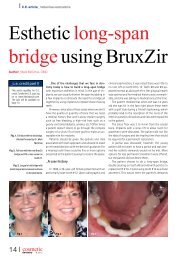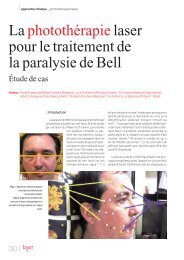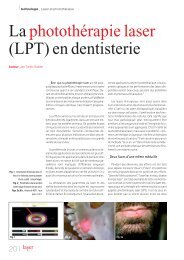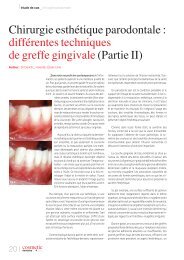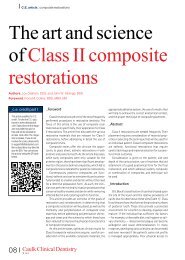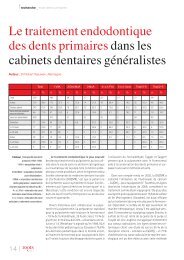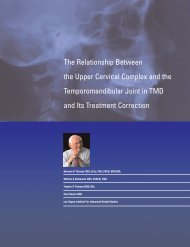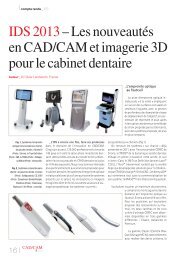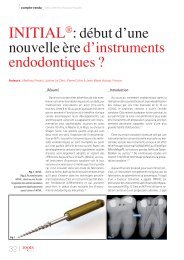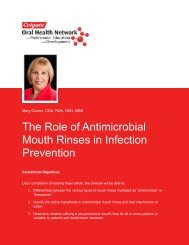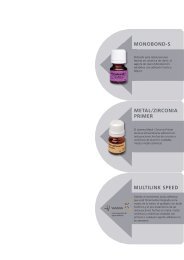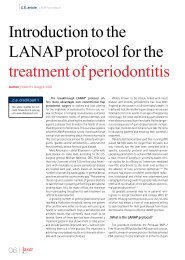Periodontal Disease and Overall Health: A Clinician's Guide
Periodontal Disease and Overall Health: A Clinician's Guide
Periodontal Disease and Overall Health: A Clinician's Guide
You also want an ePaper? Increase the reach of your titles
YUMPU automatically turns print PDFs into web optimized ePapers that Google loves.
CHAPTER 2 Overview of <strong>Periodontal</strong> <strong>Disease</strong>:CHAPTER 2 Causes, Pathogenesis, <strong>and</strong> Characteristics 19dazole can be used to treat acute necrotizingulcerative gingivitis (NUG), 52 <strong>and</strong> metronidazole/amoxicillincombination therapy canbe used to treat aggressive adolescent periodontitisassociated with A. actinomycetemcomitans.53 Systemic antibiotic therapy hasthe advantage of simple, easy administrationof drugs to multiple periodontal sites. However,patient compliance needs to be considered,inability to achieve adequate concentrationsat the site of infection, adverse drugreactions, <strong>and</strong> the develop ment of antibioticresistance can be issues. 54 Common antibiotictherapies for the treatment of periodontitisinclude metronidazole, clindamycin, doxycyclineor minocycline, ciprofloxacin,azithromycin, metronidazole/amoxicillin,<strong>and</strong> metronidazole/cipro floxacin. 55 For adultpatients with acute periodontal abscesses,amoxicillin is used as an adjunct to incision<strong>and</strong> drainage. For patients with allergies tobeta-lactam drugs (e.g., amoxicillin), azith -romycin or clindamycin would be the choice.Researchers have shown that periodontaltreatment can benefit some systemic diseasesknown to be associated with periodontitis,such as diabetes <strong>and</strong> preterm delivery.Grossi <strong>and</strong> colleagues reported that diabeticpatients receiving scaling <strong>and</strong> root planingwith systemic doxycycline showed significantreductions in mean HbA1c. 56 Effectivetreatment of periodontal infection <strong>and</strong> reduc -tion of periodontal inflammation is associatedwith a reduction in levels of glycatedhemo globin. Clothier <strong>and</strong> colleagues alsoshowed that performing scaling <strong>and</strong> root planingin pregnant women with periodontitismay reduce preterm delivery. 57 However, ad -junc tive metronidazole therapy did not im -prove pregnancy outcomes. Two recent studieshave not shown improvements in adversepregnancy outcomes with scaling <strong>and</strong> rootplaning. 58 However, the level of perio dontaltreatment provided may have been veryinadequate. More studies are needed in thisfield to determine the effect of periodontaltreatment on the outcomes of adverse pregnancy<strong>and</strong> the extent of therapy that mayneed to be provided in order to have a significantimpact.Host-Modulation TherapyBacteria <strong>and</strong> the host are two essentialfactors to the development of periodontitis.Reduction of bacterial load is the con -ventional approach for the management ofperiodontal diseases. More recently, periodontaltreatment strategies have includedhost-modulation therapy as an adjunctivetreatment option. Host-modulation therapy istreating the host response to either reduce theexcess production of cytokines <strong>and</strong> destructiveenzymes so there is less damage to theperiodontal tissues, or to stimulate the regenerative process, allowing for the restorationof connective tissue attachment <strong>and</strong>bone formation to occur.Host modulation was first introduced todentistry by Williams 59 <strong>and</strong> Golub <strong>and</strong> colleagues.60 Williams stated: “There are compellingdata from studies in animals <strong>and</strong> humantrials indicating that pharmacologicagents that modulate the host responses believedto be involved in the pathogenesis ofperiodontal destruction may be efficacious inslowing the progression of periodontitis.” 59Golub <strong>and</strong> colleagues discussed “host modulationwith tetracyclines <strong>and</strong> their chemicallymodified analogues.” 60 A variety of differentdrug classes have been evaluated ashost-modulation agents, including the non -steroidal anti-inflammatory drugs, bisphosphonates,tetracyclines (Figure 4), 36 enamelmatrix proteins, growth factors, <strong>and</strong> bonemorphogenetic proteins.Systemically Administered AgentsSubantimicrobial-Dose DoxycyclineSubantimicrobial-dose doxycycline (SDD)is the only FDA-approved MMP inhibitor<strong>and</strong> systemic host-modulation therapy for the



